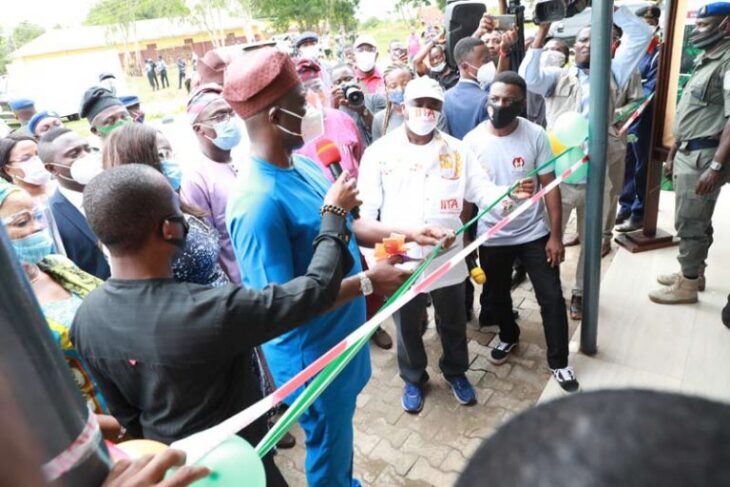The Oyo State Government and the International Institute of Tropical Agriculture (IITA) have launched a joint new initiative known as the Start Them Early Program (STEP), aimed at introducing agribusiness training in secondary schools in Oyo State.
His Excellency, Governor of Oyo State, Engr. Seyi Makinde inaugurated the program and a modern agribusiness training facility at Fasola Grammar School in Fasola community, Oyo State, on 15 July 2020.
The Start Them Early Program (STEP), an IITA initiative conceived in 2018, aims at advancing agribusiness development to secondary schools in Africa.
In Oyo State, the program will be run by the Oyo State Agribusiness Development Agency (OYSADA) in conjunction with the IITA.
The overall objective of STEP-Oyo is to steer younger generations towards agriculture and agribusiness as a career path at an early age and provide them with hands-on experiences required for a lifetime of success in the industry.

STEP-Oyo aims to rid young secondary school students of counterproductive mindsets about agriculture, build their capacity and make them aware of the variety of career opportunities connected to the agriculture sector and as a result breed a new generation of Nigerian agribusiness leaders.
Research shows that experiences acquired during the formative period of an individual’s life often set the future direction of a person’s life course by affecting the choices made. Hence, the need to expose young students to the vast career opportunities available in agriculture beyond the farm, while building their capacity to harness them well.
The STEP team will engage a selected number of students and teachers at Fasola Grammar School and train them on modern agricultural technologies, including production and value addition of agricultural commodities such as cassava, maize, soybean, poultry, and vegetables.
They will also be exposed to how to use mechanisation and ICTs to enhance agricultural productivity.
STEP aims to realise its objectives through agricultural education in formal education systems via the secondary schools’ agriculture curricula, providing supervised agricultural experiences in pilot enterprises across various agribusiness value chains (crop production, small animal production and value addition) and the establishment of extracurricular agribusiness clubs.
A thrilled Governor Makinde praised the STEP model, remarking that the combination of theoretical coursework and hands-on experiential learning in agribusiness enterprises will prove particularly effective in reinforcing lessons and producing well-rounded young agribusiness leaders.
Governor Makinde described the program as timely and reminiscent of the 1980s and early-90s when Nigeria had a much more viable agriculture sector underpinned by school farms and Young Farmers Clubs where young students and adults acquired modern techniques in agriculture and built capacity in agribusiness on the way to successful careers in agriculture.
“We remain steadfast in our resolve to grow our economy through agribusiness. In the 80s to early 90s, we had the Young Farmer’s Club in schools. There was also the School to Land Programme in Rivers State,” he said.
“These programmes helped to steer the interest of some youths towards agriculture, and I must say that some people who have grown to become farmers today developed their interest in the sector because of those initiatives,” he further said.
“Now is time to borrow a leaf out of the 80s book and bring back this initiative. This pilot programme will expose young minds to careers in agriculture that they never knew existed, and they will be given the needed direction to pursue these careers,” he added.
Governor Makinde described STEP as a laudable project worthy of emulation by the entire country, and a necessary avenue to redirect young minds into profitable ventures along the value chains of agriculture.
The programme, he pointed out, will be replicated by the state government in all zones of the state.
“One of the challenges that agribusiness is facing is that in most parts of Africa, when we talk about agriculture, is that it is a profession of old people and not young people,” he said.
“The truth is, what we set before young people as a goal is what they will pursue. When our parents told us to be doctors, lawyers, engineers and architects, we followed that path. The school system also emphasised those professions. It is now time to diversify. It is time to start teaching our children, the business of agriculture.
“And this ties up nicely with our plans here in Oyo State to leverage on agriculture to grow our economy. We have created the Oyo State Agribusiness Development Agency. Through this agency, we have recently launched the Youth in Agribusiness Tomatoes Project targeted at youths in Awe in Oyo, Igboora in Ibarapa and Tede in Oke-Ogun zones.”
OYSADA estimates that through STEP, about 25,000 secondary school students will be trained in modern agriculture and agribusiness by 2024, which will see more students continue their pursuit of post-secondary education in the agricultural disciplines and related careers.
In addition, the program is also expected to facilitate the complete overhaul of existing agriculture curricula and hasten a move towards electronic-based learning in secondary schools in Oyo State.
The STEP program is a key part of OYSADA’s Agribusiness Education Development Programme which aims to attract youth to and retain them in the agriculture sector so they become the engine driving new agriculture and agribusiness enterprises as well as rural transformation in Oyo State.



